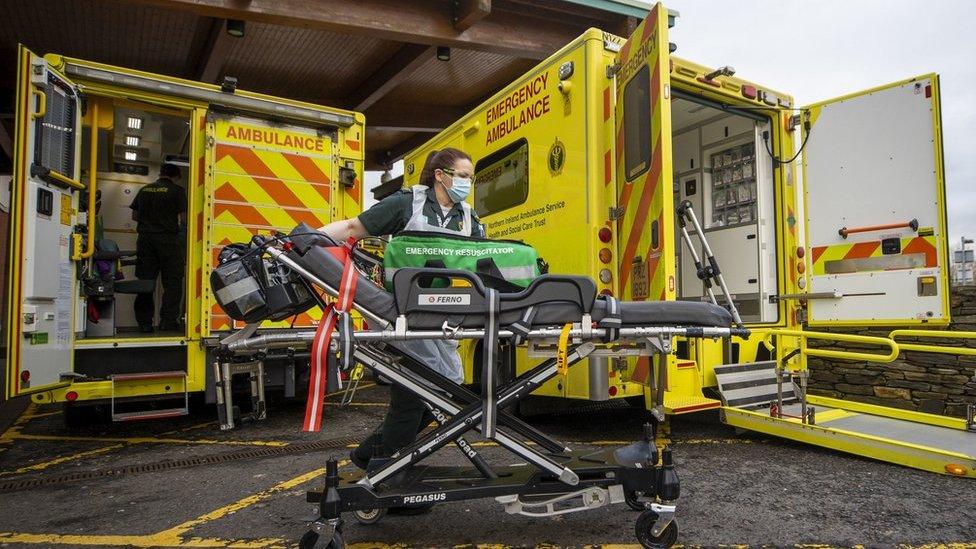'Major changes needed' at NI emergency departments
- Published
BBC News NI gains special access to the emergency department at Altnagelvin Hospital.
Major change is required if Northern Ireland's emergency departments are to avoid another "exceptionally difficult" winter, a senior consultant has warned.
Dr Brendan Lavery, who works for the Western Health Trust, said "standing still is not an option".
He described the system as currently operating on a "knife edge".
The Department of Health said it was "a very challenging time" for staff "with Covid-19 restrictions impacting on an already fragile system".
Speaking to BBC News NI, Dr Lavery likened the situation to "Groundhog Day" with decade-long problems like capacity and staffing exacerbated by the lingering effect of the Covid-19 pandemic on other healthcare services.
The department responded: "Well before Covid-19, there was clear evidence that our urgent and emergency care services were under increasing pressure.
"This is an unsustainable position that requires sustained investment and reform, including, of course, long-term investment in staffing. There is no quick or easy solution to these problems.
"The department's review of urgent and emergency care will be published next month and will be the subject of public consultation."
'We try our best'
Dr Lavery laid bare the scale of the difficulties as BBC News NI was given exclusive access to Altnagelvin Hospital's emergency department.
"Winter is no doubt going to be exceptionally difficult," he said.
"Our attendances are increasing month-on-month again.
"We are back up to pre-Covid attendance levels, we simply don't have enough beds to admit patients to.
"All we can do is try our best as always."
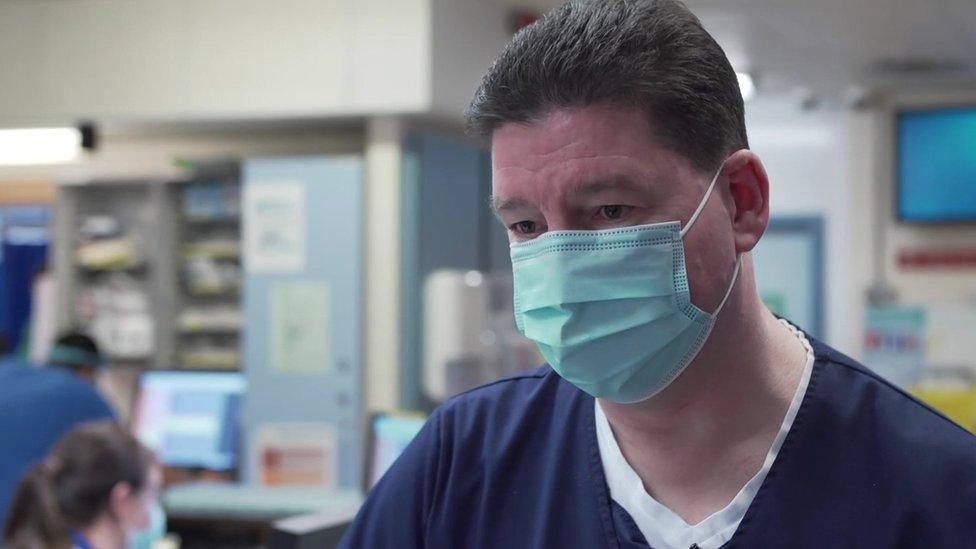
Dr Brendan Lavery said it was like Groundhog Day as annual problems reoccur
In recent weeks, health trusts across Northern Ireland have used social media to highlight how busy they have been.
On Tuesday, Belfast's Royal Victoria Hospital recorded its highest ever emergency department attendance with 430 patients arriving over a 24-hour period.
When BBC News NI visited the emergency department at Altnagelvin Hospital in Londonderry, there were 32 patients awaiting hospital admission, filling many of the assessment cubicles.
Social distancing to ensure safety is making the situation more challenging.
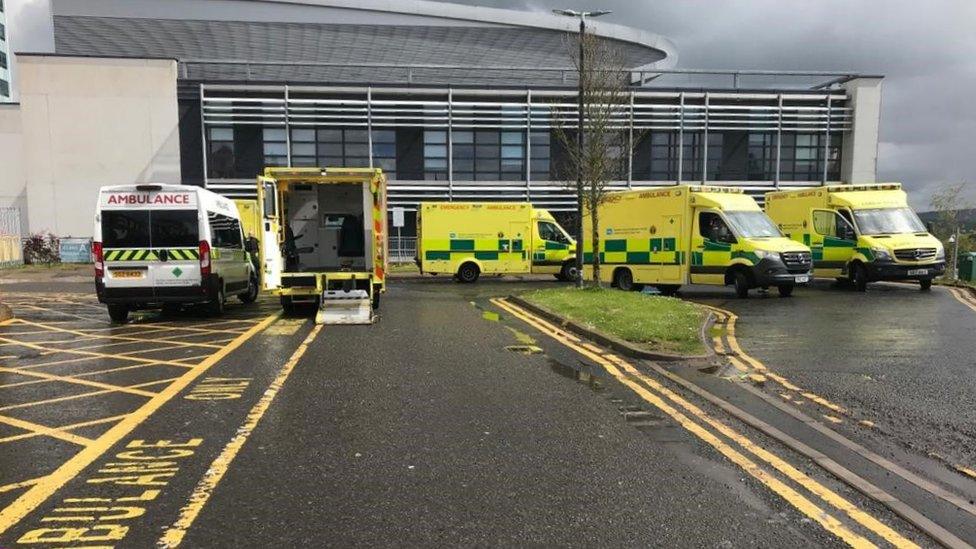
Among the patients was 77-year-old Olive, who had been waiting more than 24 hours for a bed on a hospital ward.
Her daughter, Clare, said: "The doctor came in and he could not have apologised any more.
"My heart broke for him; my heart really broke for him because his hands were tied.
"His words were to me 'I don't have any beds'.
"What do you say to that? It's just unbelievable, it really is."
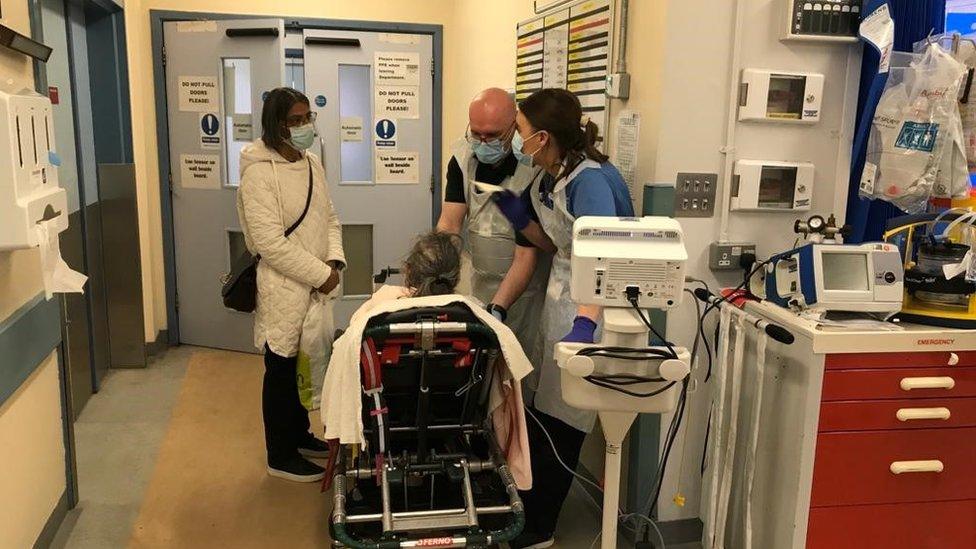
Vindi Torney said she had every faith in the staff who treated her 90-year-old mother Charan Nagra
Another patient, 90-year-old Charan Nagra, who has dementia, was brought to the hospital in an ambulance which had been called by her GP.
After being assessed on a trolley she was moved to the resuscitation area because there was not enough space in the emergency department.
Her daughter Vindi Torney said: "It kind of worried me at the start when they said she was going into one of the 'resuss' rooms but I understand that they are very crowded and that's where she has to be.
"The staff are brilliant in here and I have every faith in them.
"So wherever they can find a safe space for her, that's fine with me.
"I have seen A&E a lot busier than this and I have had to wait with her for 12 hours and more. This isn't too bad. As long as she's well looked after that's all we want as a family."
For those working in the emergency department, the pressures are also relentless.
Deputy Sister Laura Dalzell said: "The most frustrating thing at the minute is coming in to the number of patients awaiting on hospital beds within the hospital.
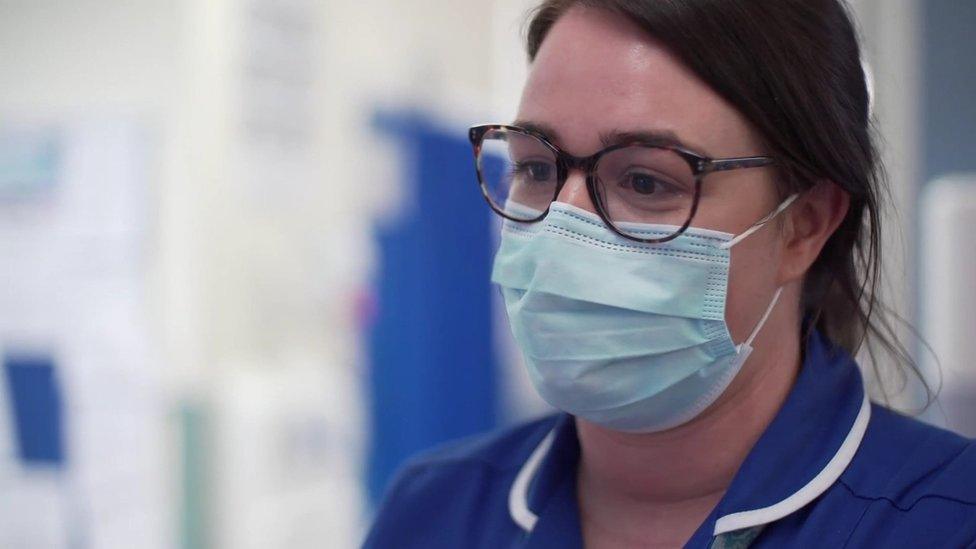
Deputy Sister Laura Dalzell said staff live in hope that the situation will improve
"We are coming in to an already bunged A&E department. It's then starting a new day within A&E for A&E patients where we are struggling for space to see new patients presenting to A&E as we have got cubicles full of patients awaiting beds within the hospital.
"Every day we come on shift we live in hope that something will ease or things will improve, but at the present moment it hasn't changed."


With every cubicle in the emergency department occupied and some patients being attended to in chairs and ambulance trolleys it was disheartening to hear a consultant describe coming into hospital every day like "groundhog day" as nothing was changing.
It also felt disheartening as I have been covering this same story now for more than 10 years. In fact, I could grab a 2011 script and readers would probably not know the difference.
The same problems keep occurring; not enough hospital beds and nursing staff, care in the community needs enhanced and greater momentum to create proper facilities that deal with end of life care.
Without all of these matters being attended to, anything and everything seems to end up at the door of accident and emergency.
What is different is that we are witnessing packed waiting areas at the start of the summer as opposed to mid-winter. A knock on effect from the pandemic.
But now that Covid figures are under control the health service is beginning to see old problems creeping back into the system again. It didn't take long.
The system needs more hospital beds.
When we filmed in Altnagelvin's A&E, staff said they required an additional 30 beds and at least four more staff to fill gaps in the rota.
The problems that we are witnessing now are the same problems that prompted a review into emergency care by the health and social care board in 2014; also health reports by Sir Liam Donaldson 2015, external; John Compton 2016, external, Raphael Bengoa 2016, external and separate reports over the years by the Royal College of Emergency Medicine and the Department of Health.
The Department of Health's latest report into emergency care is 'No More Silos', external, published last October. Sadly there is little optimism at present that it will achieve where many others have failed.

Last October, the health minister published a 10-point plan aimed at improving urgent and emergency care.
The 'No More Silos' document related to two main areas: how the public access urgent or emergency care when they need it and how older people and others who need support will be offered treatment in the community to avoid admission or long delays in hospital.
A number of initiatives already in place include the Phone First telephone triage service and an urgent care centre at Belfast's Royal Victoria Hospital.
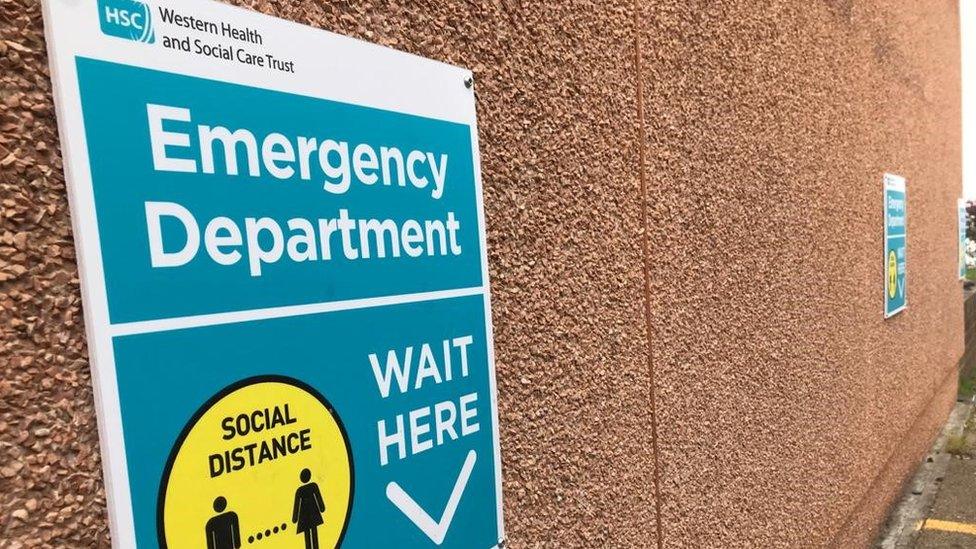
Health trusts have used social media to highlight how busy emergency departments have been in recent weeks
'Public is not the problem'
The Department of Health said there were plans to establish more urgent care centres across the region in the coming months and new processes are also being put in place to ensure patients can be discharged in a more timely manner.
Dr Lavery called for the same creativity used to deal with the pandemic to be deployed to tackle recurrent problems with overcrowded emergency departments and over-stretched staff.
He added: "We keep trying to do more with the same resources. I know there is no magic money tree - I know that we have to work within our financial budget - but equally it is very difficult as a clinician to watch nursing colleagues who are processing 200 patients per day through an emergency department and also nursing one to two wards at the same time.
"We are in May. In theory this should be the quiet time of emergency departments and medicine in general. It simply isn't.
"So, if we do not change things by winter we are looking at potentially very, very serious problems in providing healthcare. And providing emergency healthcare for patients who need it.
"The patients who are here need to be here, there's no major issue with inappropriate attendances and I think it's unfair for the public to get the impression that they are part of the problem because, quite simply, they are not."
Related topics
- Published13 April 2021
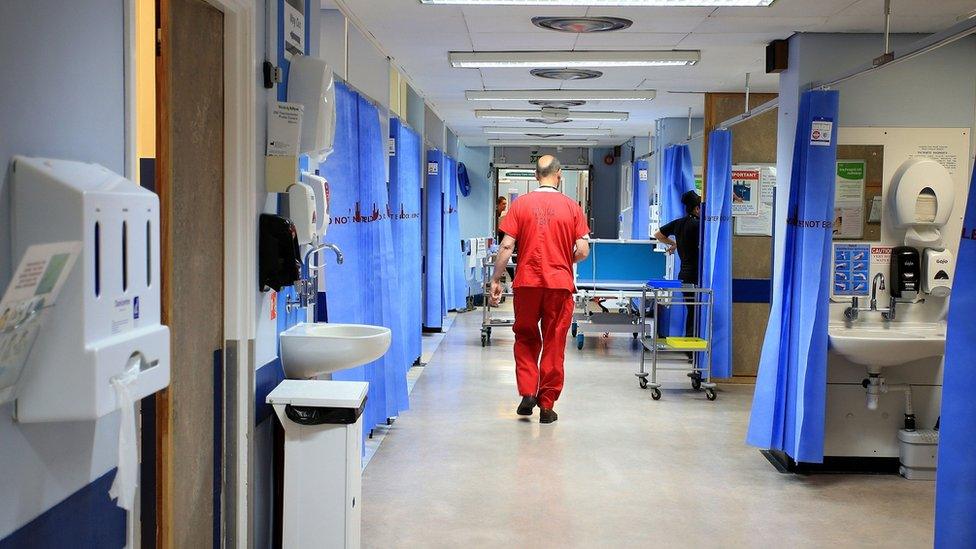
- Published28 February 2020
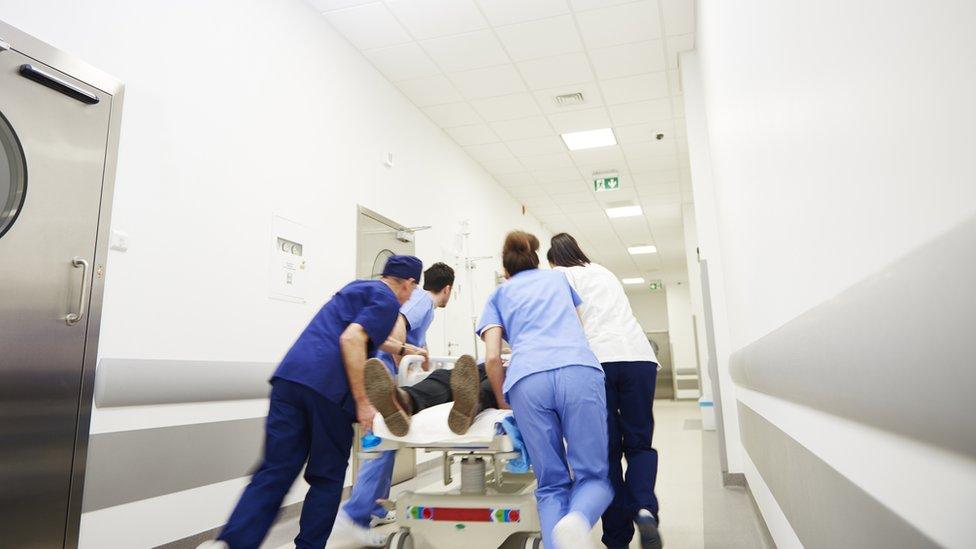
- Published1 March 2021
